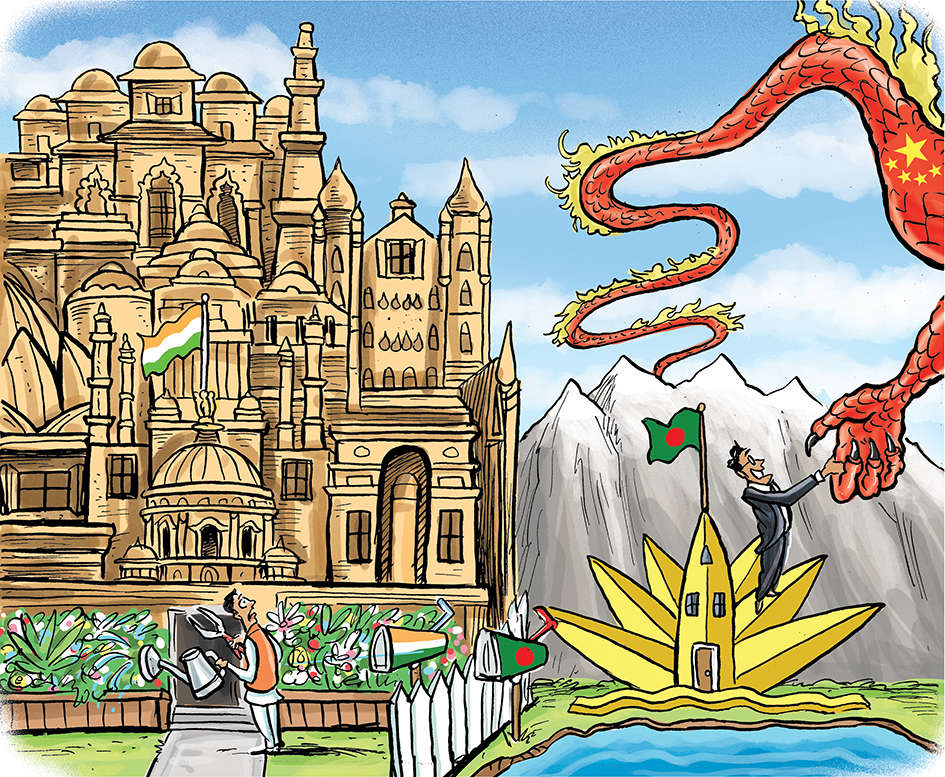
GDP per capita – $1,887.97 of Bangladesh, will edge past India’s $1,876.53. Neighbouring Sri Lanka’s GDP per capita – around $ 4,000 – is already twice that of India.
by Yead Mirza 7 November 2020
International Monetary Fund (IMF) recent data showed that Bangladesh’s per capita gross domestic product (GDP) growth rate is predicated to become the highest in South Asia and the fourth-highest in the whole of Asia in 2020 compared to that of last year. It’s per capita GDP growth would be the sixth-highest in the world in the same year.
The IMF’s latest World Economic Outlook (October 2020) Database suggests that India’s per capita GDP for 2020 will be lower than Bangladesh. The report predicts that Bangladesh’s per capita GDP would rise to $1,887.97, while India’s would fall to $1,877 in 2020. Bangladeshis, Indians, and people from other South Asian countries were understandably surprised when they learned about this news.
From the time it appeared in the media, the GDP issue had been prime news for quite a while in Bangladeshi and Indian broadcasting, print, and online media outlets. Social media users on both sides of the border had enthusiastically spoken, discussed, and debated about the issue.
When an ambitious country like India trails behind a smaller country like Bangladesh, it shows that India is under-performing in comparison with its ambitions. Although India aspires to become a major power in the Indo-Pacific region, the reality is that India is losing its influence in its own backyard, South Asia. Hence, India’s dream of becoming the Indo-Pacific power still remains a far cry.
In India, the current BJP-government and pro-BJP media have been blaming the coronavirus pandemic for India’s current economic despair. But the reality is that according to the extracts of a Washington Post article, “India might have eventually lost the race to Bangladesh even without the pandemic.”
Indeed, many experts claim that Bangladesh’s higher and India’s lower annual per capita GDP growth rate for the last five years has allowed Bangladesh to close the economic gap with India. Bangladesh’s per capita GDP has been growing at a compound annual growth rate of 9.1 percent in the last five years compared to India’s 3.2 percent growth for the same period — something which drew Bangladesh near India’s per capita GDP and now the former is predicted to overtake the latter in this very important economic development indicator.
What’s more, ‘per capita gross domestic product’ is only one of the many areas where Bangladesh is overtaking India. There are many more areas where India is trailing behind Bangladesh. To put this claim in numbers, few development indicators are mentioned below:
- Bangladesh fares better than India in average life expectancy. As of October 24, 2020, the average life expectancy of the Bangladeshis is 73.57 years compared to the Indians’ 70.42. As of October 24, 2020, the average life expectancy for males in Bangladesh is 71.80 compared to 69.16 in India. For females, its 75.60 in Bangladesh compared to 71.80 in India.
- As of October 24, 2020, Bangladesh has 6 deaths per 1,000 live births, while India has 6 deaths per 1,000 live births. On the same date, the deaths under age 5 years per 1000 live births for Bangladesh is 26.1, while for India it’s 32.9.
- On the 2020 Global Hunger Index, Bangladesh ranks the 75thout of 107 qualifying countries while India ranks 94th.
In addition to these few aforementioned indicators, Bangladesh has out-ranked India in Gross Savings, Safe Childhood, Primary School Enrollment, Fertility Rate, Military Expenditure Growth, etc. Witnessing this progress, experts from both sides of the border have recently opined that life in Bangladesh is far more attractive than in India.
India has long been dreaming of competing neck-and-neck with the Chinese economy, but so far has failed to even come closer to China’s global economic position. Instead, India has been, as revealed above, gradually trailing behind its smaller neighbor, Bangladesh, in many social indexes as well as several economic indexes.
Therefore, it appears that Bangladesh, not China, is India’s first competition and that India has to first go past Bangladesh before India starts to act upon its dream of competing with China.
This article was originally published on Oped Column Syndication.
AUTHOR: Yead Mirza is a blogger, writer and observer of global current affairs. He has been published on many media-outlets including Eurasia Review, International Policy Digest, Foreign Policy News, Washington Politics Blog, Yale Global Online, Daily Times, The New Age, Daily Outlook Afghanistan, Counter Currents, and Kashmir Reader.



0 Comments
LEAVE A COMMENT
Your email address will not be published